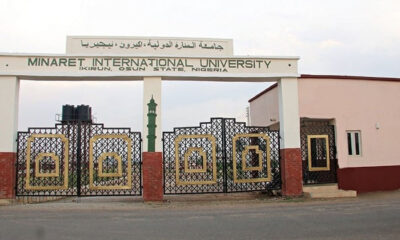metro
Police, brothel make millions as child prostitution, sex trafficking reign in Osun communities
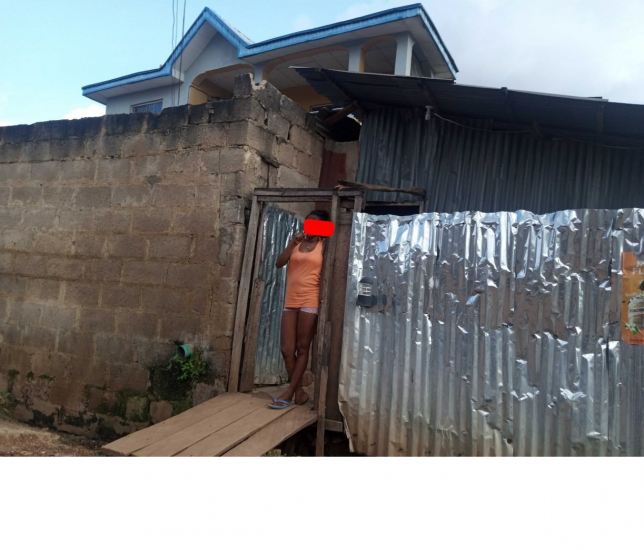
In this undercover investigation, our reporter, Sikiru Obarayese, exposed how security operatives abet child prostitution, trafficking and make millions of Naira from the illegal activities in Osun communities.
Sometime in early 2021, a 17-year-old girl, Victoria, who came from Southern Nigeria, followed a boyfriend to an Osun community in search of a greener pasture. After she was maltreated and sent out to the street by her boyfriend, the teenager met a young woman in an Osun community offering her “woman’s job” with no further explanation about the offer.
Victoria was later invited to Ilesa by a young lady identified as Precious where she would start the “woman’s job” — Vitoria had told Precious, who claimed she is 22-year-old, about her inability to gather fare from Osogbo to Ilesa, in which the lady promised to settle the fare after meeting her at a park.
READ ALSO:
- Guests stripped naked as EFCC raids Daniel’s hotel, management kicks
- Court jails three brothers for Internet fraud, to forfeit SUV, N3.5m
- No cracks on MMA2 parking lot pillars — Bi-Courtney
In another conversation with Precious among several discussions they had; Victoria, who is an undercover agent, asked again to reaffirm if being a 17-year-old old girl – an underage – would not be a problem. The young lady acknowledged her age and gave her the green light to meet her at a roundabout, near a motor park in Ilesa.
Victoria eventually met with Precious who is a sex worker at Frayo, Itishin area in Ilesa. The brothel is one of the few with high numbers of underage girls trafficked from eastern and northern parts of the country.
Child trafficking, according to the United Nations Organization, refers to the recruitment, harbouring, transportation, provision, obtaining, patronizing, or soliciting of a minor for the purpose of exploitation, forced labour, slavery and commercial sex act.
Sex trafficking on the other hand is human trafficking for the purpose of sexual exploitation, including sexual slavery, which is considered a form of modern slavery.

Young sex worker identified as Precious
Though there is no law against prostitution in Nigeria about age or consent, but according to the UN, it is illegal when someone is harbouring, transporting for the purpose of exploitation, or forced labour for commercial purposes.
Meanwhile, security operatives in Osun community have been exploiting and benefitting from the sexual escapades of the little girls. Sources told our reporter that police makes millions of Naira weekly from aiding the act.
Impeccable sources confirmed that security operatives make at least N1.4 million monthly from a brothel in Ilesa alone in their involvement – complicit – taking bribes.
READ ALSO:
- FG begins six-day traffic diversion on Lagos-Ibadan Expressway Monday
- Breaking: Gunmen attack Jos prison, in gunfire with security personnel
- Gunmen storm Gbenga Daniel’s hotel, whisk away photographers, lodgers
These operatives are in cahoots with the owners of the brothel, thereby exploiting, harbouring and obtaining from sex workers.
According to DAILY POST findings, the brothels, especially Frayo, have huge patronage due to the high number of underage girls. The owner of the brothel popularly call by the name of the brothel (Frayo), makes about one Million Naira weekly from the girls.
The sex economy
The two brothels under investigation were mixed with aged women and young girls, some of whom are underage. A source who is very familiar with the business said the girls have been trained. “The girls have been trained to lie and they are good at what they do,” the source said.
Frayo has over 50 rooms – all partitioned with iron panes. The owner of the facility, it was uncovered, slammed cruel punishment on any of the occupants that goes against the rules.
It was also revealed that the owner of the brothel runs the place alongside his mother – the mother who monitors the movement and activities of the ladies.
“We cannot go outside to buy what his mother sells. Though her things are expensive, her price is three times higher than the normal price, even with that, anybody caught buying things outside will be fined. The fine is always monetary,” a sex worker lamented.
Many of the girls living in the brothels said they face different challenges. None of the girls are allowed to raise the alarm or create any scene. “We all face our own businesses. Everyone has been careful here and afraid of being caught in anything that will make (Oga) Frayo lock your door,” another sex worker revealed.
One of the underage girls said, “I have been fined N50,000 before and I begged him (Frayo) for everything. They will lock your room if you commit any offence. I didn’t work for about a week until I paid him N37,000 with several pleas.”
READ ALSO:
- Gidan Gala: Where women, girls are exploited, abused
- Many feared dead in Ogun petrol tanker explosion
- APC supporters, not Benue people drink beer from 9 am till dawn insulting me – Ortom
Further findings revealed that each sex worker makes a return of N2,500 to the brothel which adds up to N125,000 daily with the calculation of 50 rooms, 875,000 weekly and N3, 750,000 monthly.
A security source told this medium that those brothels would not have been functional without the backing of security operatives, adding that there is a high possibility of involving in other illicit activities such as baby factories and harbouring criminal elements.
The crux of child prostitution & trafficking
“I am too young to be doing this job, that’s why police come to collect money from us every week in order to protect us from being arrested,” said Doris*, an underage sex worker in Osun metropolis, Southwest Nigeria.
She was trafficked from Kwande Local Government in Benue State to a brothel, named “Frayo” in Ilesa, Osun State in August 2021, by her aunt who is also into the same ‘business’.
As a young sex worker, Doris gets more patronage and bid higher from her customers than the older ones. She has a “mother” which is her aunt from her maternal family.
“Mother” in the brothels are benefactor or “guiding angel” — they are those who brought in individuals. Every daughter contributes their daily earnings to their mother while they also pay dues including “Police money” through their mother to the owner of the brothel who will remit to the police.
According to our findings, many of the girls living in the brothel are from Benue, Abia and Cross Rivers States. Some were brought to the brothel by a family member – sisters or relatives.
It was gathered that there are ‘cuts’ for the person who brings any girl in. Doris (not real name) who was brought in by her aunt said, she delivers N5000 for daily returns while others make N2,500 return to the brothel.
Doris further revealed that she pays N17,000 for security while others pay N7,000, through her aunt who is also a sex worker in the brothel.
READ ALSO:
- 70-year-old woman arrested for drug trafficking in Edo
- Coscharis announces free Renault diagnosis, discount on service, parts
- Lions Club, Heal the World celebrate orphans, offer scholarships, gifts
Her aunt promised her that she would work for two weeks but changed the agreement that she would have to stay till December. Findings show that Doris’ aunt is exploiting her against the earlier arrangement.
No one could take Doris out of the brothel without her knowledge. She sometimes helped her to bargain on price. “I know how much she gives me daily. She is young and new here so people like her,” her sister said.
Cash For Complicity

Sex workers at Adams brothel in Ilesa
Further investigation revealed that sex workers are confident and certain that nothing can happen to them. With their relationship with the security operatives, the sex workers are sure of constant cover.
Some of them told this reporter that every Friday is ‘police payment day’ while everyone could have contributed N5000 to their bosses – the money which was increased to 7,000 this year.
“Police don’t arrest us because we pay them weekly. Initially, we paid N5000 but it has just been increased to N7,000 recently. There are over 50 rooms in this place and we make a huge amount of money.”
According to findings, the sex workers make payments to the police through the owner of the brothel. “We have the full support of the police. Oga calls them here if anybody or customer is trying to do anything funny.”
This, according to our findings, shows that police are aware of what is going on in the brothels and as well aiding it.
Corruption, a catalyst for human trafficking in Nigeria – foreign report
Internal trafficking is prevalent with Nigerian perpetrators recruiting victims from rural areas, especially the country’s southern regions, for exploitation in commercial sex and forced labour in domestic work in cities such as Abeokuta, Calabar, Ibadan, Kaduna, Kano, Lagos, and Port Harcourt.
READ ALSO:
- Why Bethel Baptist’s Head Boy agreed to leave kidnappers’ den
- ‘Yahoo Boys’ linked to murder of pregnant nurse, lover, one other in Ondo
- Southeast govs abandoned my father in death –Ojukwu’s son laments
Traffickers – including some community members – exploit women and girls in domestic service and sex trafficking, as well as boys in forced and bonded labour in street vending, domestic service, artisanal mining, stone quarrying, agriculture, textile manufacturing, alms- begging, and in the tie-dye sector in the northwest and southwest of the country.
Nigeria Police Force has been previously accused of exploiting women in illicit activities. According to a US report on trafficking, “Unlike previous years, NPF reported its officers, arrested two traffickers in 2020, and media noted NPF officers arrested three suspected traffickers exploiting women in “baby factories,” as well as additional potential victims in December 2020 and March 2021 in Ogun and Katsina states respectively.
”Corruption affects all levels of government – including the judiciary, security forces, and law enforcement agencies – and undermines accountability for trafficking offences. Sex trafficking, according to the report occurs in government-run detention centres and IDP camps. “Without providing statistics, observers reported NAPTIP investigated allegations of human trafficking in IDP camps, in coordination with the Ministry of Defense zonal commanders.”
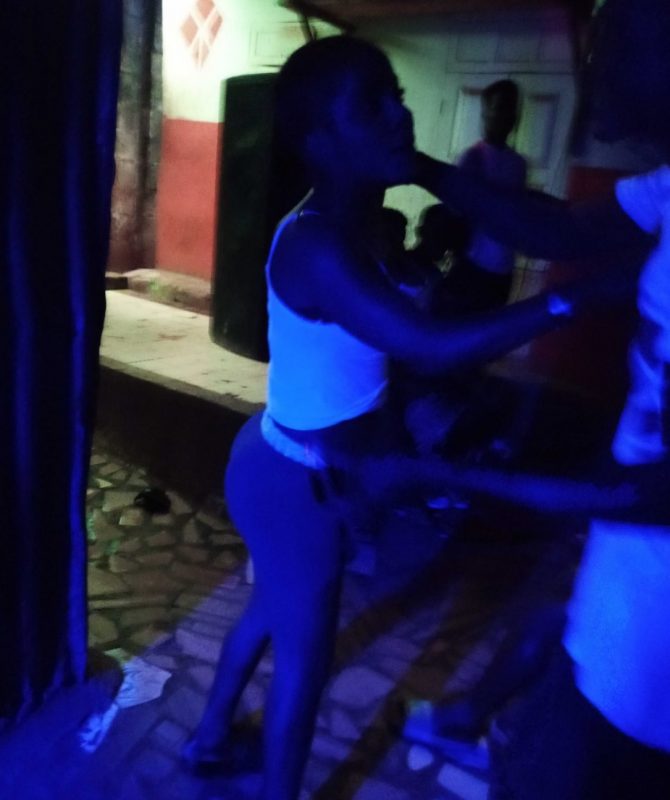
Young sex worker seducing a man
“…“Baby factories” refer to criminal enterprises often disguised as orphanages, maternity homes, or religious centres – where traffickers hold women against their will, rape them, and force them to carry and deliver a child. Experts stated this illicit activity was widespread in the country,” a United States of America special report on trafficking stated.
United States of America Department of State 2021 report from monitor and Combat trafficking in persons said the government has not met the minimum standards in several key areas fighting trafficking in the country. The US report declared corruption a significant concern in battling the crime in Nigeria.
The US department recommended to the National Agency for the Prohibition of Trafficking in Persons (NAPTIP) and Nigeria Police Force (NPF) enhanced coordination on law enforcement efforts – including investigating illicit centres exploiting women in forced surrogacy – and prosecute suspects while respecting the rights of the accused.
Policemen from unidentified stations come to the brothel to raid — Police
Contacting the Spokesperson of Osun Police command, SP Yemisi Opalola, she said that the DPOs Ilesa denied the allegations. She further disclosed that the DPO of Ijamo divisional police station informed her that some policemen from different parts of the state come to the particular brothels to raid the place.
Opalola confirmed that the command made different arrests of some hardened criminals in the particular brothels investigated by DAILY POST, promising that further investigation could be conducted.
“I contacted the DPOs, they said they are not aware of the allegations, that further investigation will be conducted through their men. The Ijamo DPO affirmed that they have arrested some hardened criminals before at the brothels. Likewise, some policemen from Osogbo and other unidentified stations also go there to raid.
“The command will definitely investigate further because it is unusual.”
We will investigate this — NAPTIP reacts
The zonal coordinator of NAPTIP in Osun State, Mustapha Saadu said the agency will carry out an investigation on the brothels. He added that the command had not heard about the said brothels or their activities.
Meanwhile, the head of the investigation of the agency in the zone who was in the same room with the coordinator during the visit of this reporter to NAPTIP office in Osogbo acknowledged the “police money”.
Daily Post
metro
2027 Polls: Christian Group Cautions Shari’a Council Over INEC Boycott Threat

2027 Polls: Christian Group Cautions Shari’a Council Over INEC Boycott Threat
The Christian Social Movement of Nigeria (CSMN) has cautioned against attempts to politicise the leadership of the Independent National Electoral Commission (INEC), warning that threats to boycott elections on religious grounds could heighten tensions and weaken public confidence ahead of the 2027 general elections.
In a joint statement signed by its Governing Council Chairman, Elder Sunday Oibe, and Chief Executive Officer, Bosun Emmanuel, the group urged religious bodies and socio-political organisations to exercise restraint in public pronouncements capable of straining Nigeria’s already fragile political and security environment.
The warning followed a recent call by the Supreme Council for Shari’ah in Nigeria (SCSN) for the resignation of INEC Chairman, Prof. Joash Amupitan. Speaking at its 2026 pre-Ramadan lecture in Abuja, the Islamic body described the INEC chairman as a threat to electoral credibility and cautioned that Muslims might reject elections conducted under his leadership, citing concerns about neutrality and integrity.
READ ALSO:
- Starvation Cult Preacher Faces Expanded Murder, Terrorism Charges in Kenya
- Lagos Allocates 180 Shops to Displaced Alabarago Market Traders
- Cubana Chief Priest Vows to Oppose Peter Obi in 2027 Presidential Race
Reacting to the development, CSMN clarified that its position was not in defence of any administration or individual but a principled appeal to safeguard the credibility of Nigeria’s electoral process. The group stressed that appointments into key national institutions such as INEC leadership must strictly follow constitutional provisions rather than religious or sectional pressure.
“With the numerous challenges facing Nigeria, all well-meaning citizens must exercise restraint in words and actions that could escalate an already volatile situation,” the statement read.
The organisation noted that previous administrations had appointed INEC chairmen from different religious backgrounds without triggering threats of election boycotts. It warned that injecting religion into the administration of elections risks deepening divisions and undermining trust in democratic institutions.
CSMN further observed that leadership appointments in federal institutions have historically reflected Nigeria’s diversity and should not be exploited for religious mobilisation. According to the group, sustained religious polarisation could erode confidence in national institutions and weaken democratic stability ahead of 2027.
On broader constitutional concerns raised by some Islamic organisations, the Christian body called for clearer legal interpretation of the role of Sharia within Nigeria’s plural legal system, advocating long-term constitutional reforms aimed at promoting equity, justice and national unity.
The group urged religious leaders, civil society organisations and political actors to embrace dialogue, respect institutional processes and prioritise national cohesion. It emphasised that Nigeria’s stability depends on reducing religious confrontation rather than intensifying it as preparations gradually begin for the next electoral cycle.
2027 Polls: Christian Group Cautions Shari’a Council Over INEC Boycott Threat
metro
Suspected IED Explosion Rocks Bayelsa Secretariat, Police Arrest Suspect

Suspected IED Explosion Rocks Bayelsa Secretariat, Police Arrest Suspect
A suspected improvised explosive device (IED) detonated early Wednesday at the Bayelsa State Secretariat Complex in Yenagoa, prompting an emergency response from security agencies and temporarily disrupting official government activities. Authorities have assured the public that the situation is under control, with no casualties and no property damage reported.
The Bayelsa State Police Command, led by Commissioner CP Iyamah Daniel, confirmed the incident, stating that the explosion occurred at approximately 6:00 a.m. Security operatives, including the Explosive Ordnance Disposal (EOD) Unit, the Special Drone Unit, and other tactical teams, were immediately deployed to the scene to contain the situation.
Upon arrival, police cordoned off the area and conducted a detailed search, during which they discovered another unexploded device, which was safely neutralised by EOD personnel. The swift response ensured that the Secretariat and nearby facilities were secured without further incident.
READ ALSO:
- Regina Daniels Shares Emotional Message on Children’s Welfare Amid Custody Battle
- Electricity Workers Serve 21-Day Nationwide Strike Notice to FG
- NAPTIP Cracks Down on Traffickers as 23 Nigerians Return from Thailand
Police also arrested a suspect, identified as Pentecost Elijah, a 60-year-old man from Otuan Community in Southern Ijaw Local Government Area. He is currently undergoing interrogation at the State Criminal Investigation Department, and authorities stated he will be charged in court once investigations are concluded.
In response to the explosion, the Bayelsa State Government ordered a temporary four-hour closure of the Secretariat, affecting over 6,000 state employees. The directive, issued by the Head of Service, Dr Wisdom Ebiye Sawyer, allowed security agencies to complete safety checks and restore normalcy.
Access roads leading to the State Secretariat and Bayelsa State Government House were cordoned off during the security operation, while officers urged residents to remain calm and vigilant. Authorities also called on the public to report any suspicious activities to the police to prevent further threats.
The incident has raised concerns over the security of government institutions in Nigeria and highlighted the importance of emergency preparedness, bomb detection, and rapid response operations. Residents have been assured that normal operations have resumed and that the security of the secretariat and its staff remains a top priority.
Suspected IED Explosion Rocks Bayelsa Secretariat, Police Arrest Suspect
metro
Electricity Workers Serve 21-Day Nationwide Strike Notice to FG
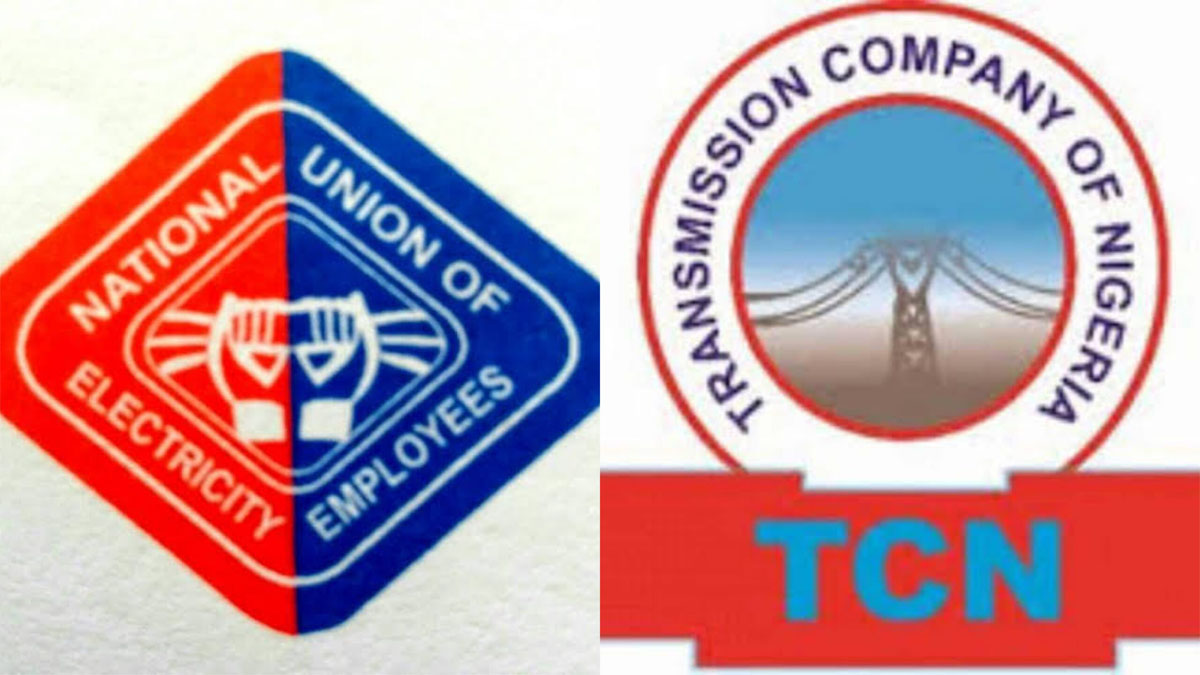
Electricity Workers Serve 21-Day Nationwide Strike Notice to FG
Electricity workers under the National Union of Electricity Employees (NUEE) have issued a 21-day nationwide strike notice to the Federal Government (FG), warning of potential disruption to power generation and distribution if longstanding labour grievances are not addressed. The union cited anti-labour practices, wage violations, unpaid pensions and taxes, and worsening job insecurity across the Nigerian Electricity Supply Industry (NESI) as the basis for their action.
In a letter dated January 26, 2026, addressed to the Minister of Power, NUEE’s Acting General Secretary, Igwebike Dominic, lamented that repeated attempts to resolve precarious working conditions in power generating companies (Gencos) and distribution companies (Discos) since the privatisation of the sector over 12 years ago have been largely ignored. The union emphasised that previous communications to the ministry failed to elicit meaningful responses.
The union accused sector employers of refusing to negotiate or implement collective agreements and conditions of service, particularly in Gencos. They also highlighted the failure to implement the 2025 National Minimum Wage Act and consequential adjustments for electricity workers. According to NUEE, the sector remains plagued by managements that disregard procedural agreements and workers’ statutory rights.
READ ALSO:
- NAPTIP Cracks Down on Traffickers as 23 Nigerians Return from Thailand
- Kwara, Katsina Bloodshed: TMC Condemns Attacks, Dismisses ‘Jihadist Preacher’ Claims
- Dangote Refinery Slashes Petrol Price to ₦774, Ends PMS Bonus Window
Workers further decried restrictions on union activities, claiming that employers deny employees the constitutional right to unionise. The union said that deducted union dues, Pay As You Earn (PAYE) taxes, and pension contributions have not been remitted for prolonged periods, in some cases stretching to 82 months in Discos including those in Kaduna and Kano states.
NUEE also raised concerns about the “militarisation” of workplaces, alleging harassment, intimidation, and threats against employees by managements of companies such as Ikeja Electric and Egbin Power Plc. They stressed that despite repeated electricity tariff hikes and increased revenues, workers’ welfare has stagnated, with no promotions, salary increments, or bonuses, while frontline staff often bear the brunt of customer frustrations.
The union also accused investors in the sector of failing to fulfil post-privatisation promises, including capital injection, metering, network expansion, and improved power supply, citing these as evidence of the privatisation exercise’s shortcomings.
NUEE has called on the Federal Government to urgently intervene by convening all stakeholders to resolve the crisis. The union warned that continued neglect would leave workers with no choice but to take “legitimate labour action” to defend their rights. “We demand the immediate resolution of all these anti-labour issues within twenty-one days of the receipt of this letter. Otherwise, we will not be constrained to take our fate into our hands by employing any legitimate labour weapon suitable for the situation. This is not a threat,” the statement said.
The notice signals rising tensions in the Nigerian power sector, with potential nationwide consequences if negotiations fail. Observers say any prolonged strike could significantly affect households, businesses, government institutions, and the overall economy, highlighting the urgent need for intervention to avert a power supply crisis.
Electricity Workers Serve 21-Day Nationwide Strike Notice to FG
-
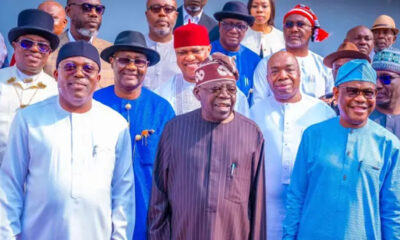
 News3 days ago
News3 days agoBREAKING: Tinubu Holds Reconciliation Meeting With Wike, Fubara, Rivers Leaders at Aso Rock
-

 Business3 days ago
Business3 days agoBoI Gets CBN Approval to Launch Non‑Interest Banking Window in Nigeria
-

 metro2 days ago
metro2 days agoLeadership Crisis at NAHCON as Chairman Abdullahi Saleh Usman Resigns
-

 News2 days ago
News2 days agoUS Judge Orders FBI, DEA to Release Tinubu’s Criminal Records, Faults Delays
-

 News2 days ago
News2 days agoOyo Muslims Reaffirm Loyalty to Sultan on Islamic Matters — Grand Chief Imam
-

 International2 days ago
International2 days agoUS to Deport 18 More Nigerians on ‘Worst-of-the-Worst’ Criminal List (Full Names)
-

 News3 days ago
News3 days agoOWN Calls for Immediate Resignation of INEC Chairman
-

 Business2 days ago
Business2 days agoNaira Posts Strong Comeback, Breaking Two‑Year High Against Dollar





